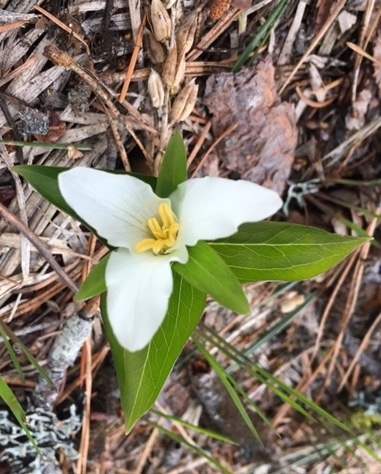Doesn’t it seem strange that Easter is a season of 50 days, Christmas of 12 and Pentecost, celebrating the birth of the church only gets one day? The weeks on the liturgical calendar from now until the beginning of Advent are labelled “after Pentecost.
Ordinary time sounds so drab doesn’t it? However it helps to realize that “Ordinary” does not mean boring or mundane. The origin of the name Ordinary Time comes from the Latin word ordinalis, which means “numbered.” This is the season that is not named for a major feast. The weeks are numbered instead. It is meant to be the season when we are God’s people focus on our work out into the world. This is the time for mission, for compassion, for caring and sharing. This is the season when we show ourselves as the people of God with the values of peace and justice and love that are the hallmark of God’s kingdom.
Being the liturgical rebel that I am, I don’t like the idea of numbers so I give the months different names instead. A growing number of churches call the season from September 1st until St Francis Day (October 4th) Creation Time. After that I like to add a gratitude season from Canadian Thanksgiving ( second Monday of October) until American Thanksgiving (4th Thursday of November) However that leaves a gap between now and September 1st. For me personally June through August is the hospitality season. I also like to add pilgrimage to that, though it is more like a moveable feast depending on what else is on the calendar. I increasingly appreciate the U.S. observances of Womens’ History month, African American History month and now Asian American and Pacific Islander Heritage Month and Gay Pride Month. Part of what I like about this is that it gives me a framework for spiritual practices that open my eyes to the diverse expressions of God’s presence in our world, strengthen my faith and equip me to go out into God’s world seeking for justice, showing love and sharing generously. What practices best prepare you for hospitality or pilgrimage? How do you practice gratitude? What about your concern for creation? I encourage you too, to name the coming months in ways that help you focus your spiritual practices so that you are fully equipped to engage in God’s world.
In yesterday’s Meditation Monday: Pentecost Has Come: I said: “One of the keys for me has been sitting down with people from other cultures and listening intently to what they say, then being prepared to change. My perspectives were disrupted by Native American and African American friends who have challenged me in life changing ways. My LBGTQIA friends educate me about the cultures of sexual orientation and how I need to change to accept them.
I see the story of Pentecost and this season beyond Pentecost as a time to view the world differently. I love the diversity of our Godspace authors who challenge us with fresh perspectives that stretch and reshape our faith. Lilly Lewin’s Freerange Friday: Go Back and Wait, written from Nashville, gives a very different look at Pentecost. I love her breath prayer suggestions for this celebration. Australian writer Rodney Marsh in his post Receive asks if we are takers or receivers, an important distinction to reflect on. James Amadon, writing from Washington state U.S. encourages us to look from altars in the world that fill us with awe and connect us to the “More” that lies within, behind, and beyond all things. Carol Dixon writing from the north of England fills us with the delight of her poetry about Ascension and Pentecost. Megan Bollen from Colorado provocatively writes about the Eco-Spiritual Practice of Picking Up Trash
Next Sunday is Trinity Sunday when we celebrate the triune nature of God. I talked about this last week, and reminded us of how important this was for Celtic Christians who embraced the Trinity as a family, and each human family unit (be it family, clan or tribe) was seen as an icon of the Trinity. Many of the Celtic prayers reflect this trinitarian nature.
I also mentioned that last year I walked around my garden photographing all the red flowers, to give me an extra boost of pentecostal fire. I then looked for tripartite flowers and leaves as symbols of the Trinity. I documented this in last year’s post Celebrating the Trinity Using Flowers. This reminder was all I needed to get out and do the practice again. I particularly love looking for tripartite leaves and flowers. The reminder that we are surrounded by so much that reflects the triune nature of God is an awesome and wonderful inspiration for all of us.
You may have noticed that I am once more trying to end these letters with a poem. This week’s is a little different as it was written to remind me that not all the ideas and thoughts that flit through my mind are meant to be shared. Sometimes they are like intimate love messages between my God and myself.
Sometimes words,
Flit through my mind,
Like the blowing wind,
Then pass beyond my grasp,
Leaving a fleeting moment
Of deep serenity,
A glow of God’s embracing love.
These words are not for sharing.
They touch my soul,
With an intimate caress
Like a kiss,
Of divine light and love.
 Digging Deeper: The Art of Contemplative Gardening
Digging Deeper: The Art of Contemplative Gardening
“My healing garden inspired by Digging Deeper has been a comfort to me in this time of transition.” – M Christine Sine’s latest book is packed full of contemplative wisdom and inspiration for creating your own meditative focus. Click for more details!

